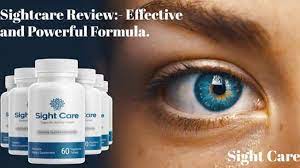In a world increasingly reliant on screens and digital devices, Sight Care review maintaining optimal eye health has never been more crucial. Sight Care encompasses a variety of practices and products aimed at preserving and enhancing vision. This article explores the key aspects of Sight Care, including preventive measures, lifestyle adjustments, and the latest advancements in eye health.
Understanding Sight Care
Sight Care refers to the proactive approach to maintaining and improving eye health. It involves a combination of daily habits, regular check-ups, and possibly, the use of supplements or corrective measures to ensure that your eyes remain in the best possible condition. This holistic approach recognizes that vision care is not just about addressing problems but also about preventing them before they arise.
Essential Practices for Maintaining Eye Health
- Regular Eye Exams:
Routine eye exams are fundamental to Sight Care. These check-ups can detect issues such as glaucoma, macular degeneration, or diabetic retinopathy early on, potentially preventing more serious problems. It is recommended to have an eye exam every one to two years, or more frequently if you have existing conditions or risk factors. - Balanced Diet:
What you eat plays a significant role in eye health. Nutrients such as vitamins A, C, and E, as well as minerals like zinc and omega-3 fatty acids, are crucial for maintaining good vision. Incorporating a diet rich in leafy greens, fish, nuts, and fruits can support eye health. - Protective Eyewear:
Wearing sunglasses that block UV rays is essential in protecting your eyes from harmful sun exposure. Additionally, if you work with screens for extended periods, blue light blocking glasses can help reduce eye strain and discomfort. - Proper Screen Use:
The 20-20-20 rule is a simple yet effective method to reduce digital eye strain. Every 20 minutes, take a 20-second break and look at something 20 feet away. Adjusting screen brightness and contrast to comfortable levels and using anti-glare filters can also help. - Hydration and Sleep:
Staying hydrated is important for maintaining tear production and preventing dry eyes. Adequate sleep also allows your eyes to rest and recover from daily strain, contributing to overall eye health.
Advances in Sight Care
Recent advancements in Sight Care include innovative treatments and products designed to address a variety of eye health concerns:
- Nutritional Supplements:
The market for eye health supplements has grown, with products containing lutein, zeaxanthin, and other antioxidants gaining popularity. These supplements are often marketed as tools to support macular health and reduce the risk of age-related eye conditions. - Advanced Eye Wear:
Technology has led to the development of more sophisticated eyewear, including glasses with adaptive lenses that adjust to lighting conditions and smart glasses that integrate augmented reality features. - Laser and Surgical Treatments:
Innovations in laser surgery, such as LASIK and PRK, have improved the precision and safety of vision correction procedures. These treatments continue to evolve, offering more effective solutions for conditions like nearsightedness, farsightedness, and astigmatism. - Telemedicine:
With the rise of telemedicine, remote eye exams and consultations are becoming more accessible. This can be particularly useful for managing chronic conditions and getting expert advice without the need for frequent office visits.
Conclusion
Sight Care is a vital aspect of overall health that requires a proactive and informed approach. By incorporating regular eye exams, a balanced diet, protective eyewear, proper screen habits, and staying updated on advancements in eye health, individuals can significantly enhance and protect their vision. As technology and research continue to advance, the future of Sight Care looks promising, offering new opportunities to maintain and improve our vision. Prioritizing eye health today will help ensure clear vision for years to come.

